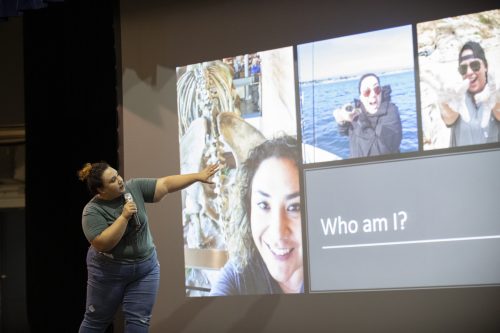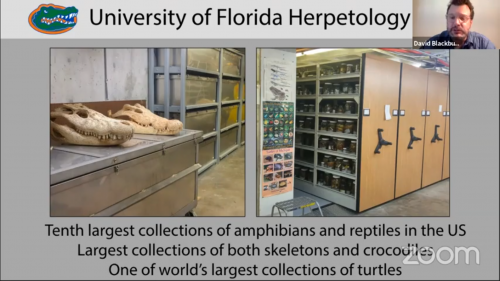This August, as Florida K-12 teachers were preparing for an unprecedented start to the school year, the Scientist in Every Florida School team gave presentations via Zoom to schools in several counties about the free resources available to help teachers get involved with the program from a distance.
SEFS began as one of only eight “moonshot” initiatives funded by the University of Florida in 2018. Their mission to not only bring scientists into the classroom, but to create long-term collaborative relationships between teachers and scientists, has only become more essential during the Covid-19 pandemic. Now, SEFS is making a point to emphasize how their free programs can enhance K-12 science education in virtual or hybrid classroom environments.
A key service that is offered by SEFS is the scientist classroom visit, in which teachers can request a scientist who specializes in a particular area. Last year, SEFS only had the capacity to offer in-person  scientist visits in five pilot counties, however this year with most teaching going virtual, they have expanded to offer scientist visits via Zoom to teachers across the state. SEFS has already received many more requests for scientist visits than in 2019, even before the school year has begun.
scientist visits in five pilot counties, however this year with most teaching going virtual, they have expanded to offer scientist visits via Zoom to teachers across the state. SEFS has already received many more requests for scientist visits than in 2019, even before the school year has begun.
The virtual visits also allow a greater range of scientists, who may have otherwise been limited by distance, to visit classrooms across the state. Currently, over 200 scientists in the SEFS database are ready to engage in educational outreach, and that number is only growing. The visits can enhance the planned science curriculum by filling in the gaps of knowledge for teachers who are less familiar with specific scientific content and can integrate current scientific research and big data that is unlikely to be found in a science textbook.
Classroom visits also can focus on the scientist’s educational journey that culminated in what they do today. These talks provide students with role models who achieved attainable goals and match the diverse backgrounds of the student body. Students who could previously only think of famous and historical scientists (such as Einstein) or actors playing a scientist on TV, will learn what a variety of different scientists do in their daily lives. Though not every student will want to have a career as a scientist, a robust exposure to scientists and current research can empower them to be scientifically literate adults.
As a direct response to the Covid-19 pandemic last spring, SEFS expanded its offerings to include a variety of digital on-demand resources including writing prompts, supplemental reading materials, hands-on activities, and videos on YouTube. In one video series, “Science Segments”, K-12 Education & Outreach

Coordinator Brian Abramowitz conducts a 5-10 minute interview with a scientist to ask them who they are, what they do and why is it important, and a question referencing a K-12 sunshine state standard.
To Abramowitz, this series is particularly helpful to students, “They don’t have to ask the question of why is this important, why are we learning about this? They can see the application in the moment in a very brief video.”
Recordings of live-streamed virtual field trips from the spring are also available to watch on the channel, and SEFS plans to continue with these events throughout the 2020-2021 school year.
Teachers participating in Scientist in Every Florida School are also given a variety of professional development opportunities to expand their scientific knowledge and gain an authentic science experience. Every July, SEFS hosts a summer workshop, in which teachers work with a scientist to create a meaningful deliverable, such as a lesson plan or project for the following school year. SEFS also offers opportunities for teachers to gain hands-on experience. During last year’s professional development field trip to the Florida Museum of Natural History’s 5-million-year-old Montbrook dig site, one teacher even made her own discovery of a rare fossil.
By building a strong network of scientists and educators, SEFS strives to expand science education in schools, and boost the confidence of teachers covering scientific topics in the classroom.
Below are several ways that you can connect with Scientist in Every Florida School:
- To request a scientist to visit your K-12 classroom, click here.
- View digital on-demand K-12 resources here.
- Join the community of teachers and scientists on Scientist in Every Florida School Facebook group here.
- Finally, to stay up to date with programming and professional development opportunities, subscribe to the monthly newsletter, here.